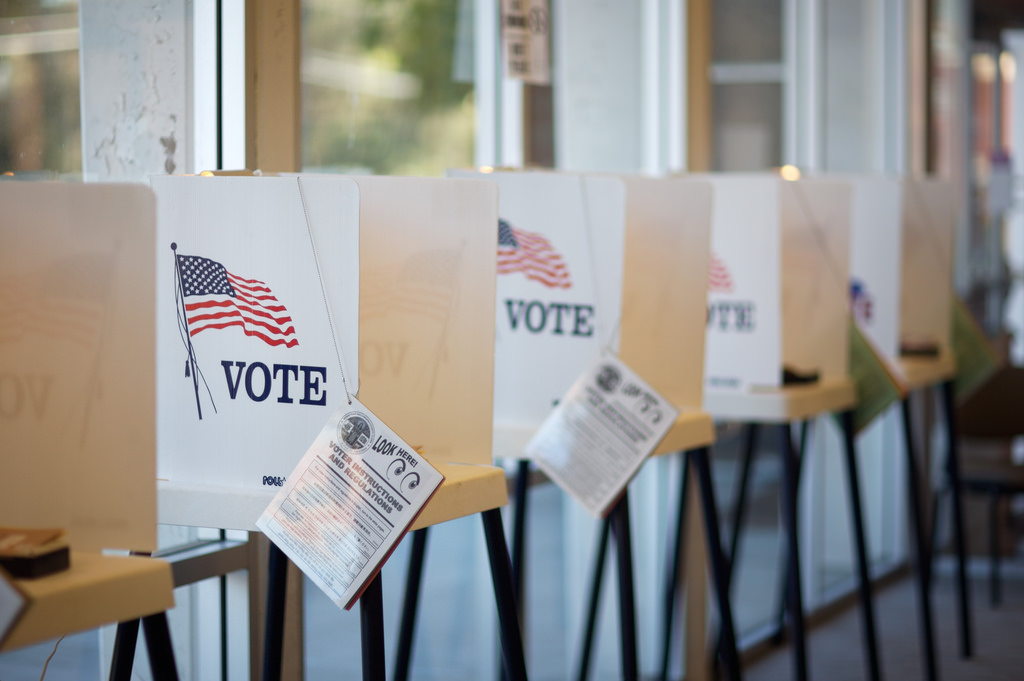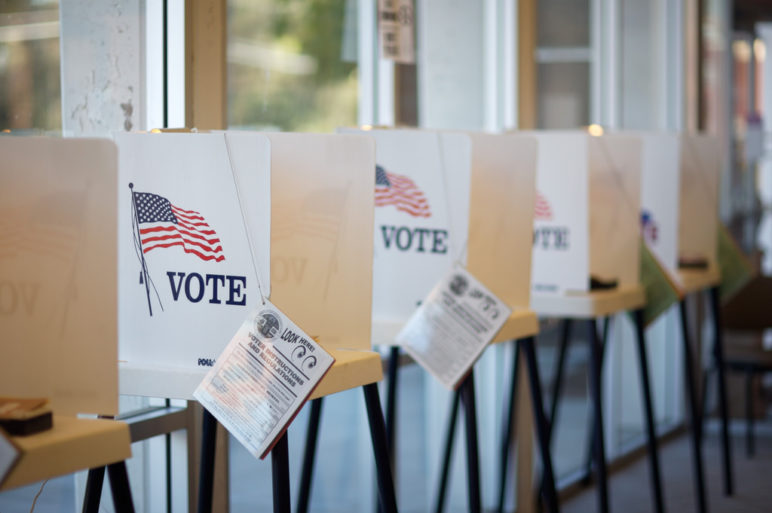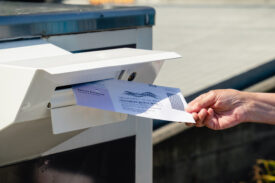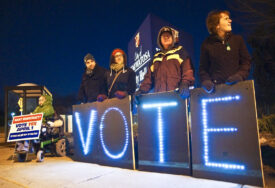It’s the time of year for swirling fall leaves and pumpkin spice. But there’s something else in the air this season: People up, Big Money down democracy fixes. In Cascadia, there’s Honest Elections Seattle (passed by a big margin last year and now poised for implementation); Open and Accountable Elections Portland, a similar policy package growing broad coalition support; a ballot measure in Washington State, the Washington Government Accountability Act; and the opportunity in Benton County, Oregon, for voters to make their choices truly count by switching local elections from first-past-the-post to ranked-choice ballots, and Multnomah County, Oregon, voters will decide on a campaign finance reform measure. (More fixes are afoot across the United States. See also: Berkeley, San Francisco, Maine, South Dakota, Rhode Island, and elsewhere. And Canada is in the midst of a national conversation about doing away with first-past-the-post voting for federal elections.)
In almost all cases, a majority of all respondents supported strategies to increase transparency and fairness in election funding.
With solutions popping up like mushrooms (yes, another regional, seasonal reference….sorry), we’re keeping our eye on the optimal growing conditions, a.k.a. opinion attitudes among US voters when it comes to voting, financing, and elections (there’s not much local or regional data at the moment that’s not propriety or simply basic election tracking stuff). So, here’s another US-level installment.
The vast majority of US voters believes money has too much influence. A New York Times / CBS News poll had the number at 84 percent a year ago. In that same survey, 98 percent thought at least some reform was needed—“minor changes,” 13 percent, “fundamental changes,” 39 percent, and “totally rebuild,” 46 percent! (And these findings have generally held up ever since.)
In 2015, the Progressive Change Institute gathered proposals for electoral reform and progressive policy in their “Big Ideas Project.” They took the most popular ideas and sponsored a national poll. The sample included 1,500 US voters—Republicans, Independents, and Democrats—who were likely to vote this November. Among other issue priorities that garner support from robust majorities—including ways to weave a stronger social safety net, put people and communities over profits, and expand opportunities for those who have been left vulnerable and marginalized—were findings centered on elections and how to curb the influence of money in politics.
In almost all cases, a majority of all respondents supported strategies to increase transparency and fairness in election funding. Here are the highlights:
Voter empowerment
It appears that when it comes to voting rights and protections, Americans want more, not less. A comprehensive “Voter Empowerment Act”—including giving Americans the day off to vote, empowering the federal government to strike down state laws that limit people’s right to vote, and automatically registering people to vote when they turn eighteen—outperformed simply making Election Day a national holiday. A comprehensive package garnered 56 percent support, a 21 point advantage over a straight-up holiday.
Meanwhile, 65 percent of Americans—with solid support across party lines—would like to eliminate the Electoral College.
Corporations and transparency
The likely US voters in this poll were strongly in favor of greater transparency. More than seven in 10 (71 percent) agreed that corporations should be required to “disclose their political donations and lobbying activity,” so that their shareholders and the public at large could determine where and how those companies are supporting political activity. A majority (61 percent) also agreed that shareholders should be able to approve whether corporations are “making political donations or supporting trade associations that lobby or make political donations.” A similar majority (59 percent) agreed that government employees should be banned from “going to work at a corporation they regulated,” and likewise that corporate executives should be banned from “taking government jobs overseeing their own industry.”
Gerrymandering
Across the board, voters dislike “gerrymandering.” Robust majorities of Democrats (81 percent), Republicans (70 percent), and Independents (67 percent) agreed that politicians should no longer be able to “draw non-competitive districts for themselves,” which would help ensure that “more elections are competitive and more politicians are forced to work hard to represent their constituents.”
Gerrymandering has likely become a proxy or stand-in for many of the things voters see not working with representative democracy—that individual votes don’t really count and that the people who are able to win office are benefiting from the rules of the game more than they are representing the people. So, it’s a good gauge of public distaste for the status quo. But gerrymandering is just one of a web of rules that work together to prevent voters from electing leaders that look and think like them. Rather than focusing on redistricting, which invariably leads to questions of who draws the lines and how, we think that taking the map and pens out of people’s hands entirely is probably a better solution—namely, by focusing not on the size and shape and make up of districts but switching to multi-member districts.
Public funding of elections
Support for various models of public funding was not as strong as support for regulations on corporate money. But there is still substantive approval, particularly among Democrats, as these number shows. For example, 57 percent of all voters agreed there should be public matching funds for small-dollar donations to congressional campaigns, in order to “put more political power in the hands of regular people.” Near majorities supported full public funding of congressional elections (49 percent), and a tax rebate for $100 in small-dollar donations (45 percent). In these areas, we saw strong to very strong support from Democrats: 70 percent supported public matching, 59 percent supported public funding of elections, and 49 percent supported a tax rebate.
Democracy fixes have not always been top of mind or even high priority issues for voters, but that seems to be changing.
The idea of putting “more political power in the hands of regular people by creating a public matching fund for smaller dollar-donations” tests well. More specifically, Progressive Change Institute compared responses to language describing two styles of matching funds, one that gives “a one hundred dollar donation from a high school teacher the same weight as a lobbyist’s seven-hundred dollar contribution,” and another where each voter would be given “a tax rebate for the first one hundred dollars in small-dollar donations they give to congressional campaigns.” The teacher vs. lobbyist message outperformed the rebate language by nearly 20 points—likely the real-life specificity of these people, beloved teacher up against not-beloved lobbyist, strikes a chord that the rebate idea didn’t. (And we know that people are generally skeptical about rebates.)
Taken together, these results clearly suggest that majorities of US voters across party lines—in some cases 70 percent and higher—would welcome some kind of reform focused on election funding, voter empowerment, and transparency that all add up to greater influence for regular citizens. That doesn’t mean that people are clamoring for change. Democracy fixes have not always been top of mind or even high priority issues for voters, but these issues are gaining salience.
With public opinion looking favorable and little victories cropping up here and there, solutions could indeed mushroom—this autumn and beyond.
A note on methodology: The poll was conducted January 9th through the 15th, 2015, by GBA Strategies on behalf of the Progressive Change Institute. The margin of error is +/- 2.5 percent.











Comments